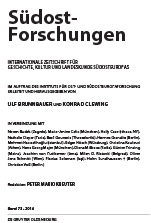Social Fragmentation of Industrial Workforces. Yugoslav Motor Vehicle Industry During Self-Managed Socialism
Social Fragmentation of Industrial Workforces. Yugoslav Motor Vehicle Industry During Self-Managed Socialism
Author(s): Ulrike SchultSubject(s): Economic history, Post-War period (1950 - 1989), History of Communism, Socio-Economic Research
Published by: De Gruyter Oldenbourg
Keywords: Self-management; communist ideology; Yugoslav industry;
Summary/Abstract: The article addresses the social differentiation among industrial workforces in two Yugoslav motor-vehicle factories in the period between 1965 and 1985. Along which lines did social inequalities, which were negated in official communist ideology manifest and how were they articulated? How were they dealt with in the complex environments of self-managed enterprises in respect to the official doctrine? Based on archival material from factory archives, the League of Communists and the socialist mass organisations and on published sources such as factory newspapers, the industrial workforces are described as heterogeneous with shifting affiliations between its sub-groups. Three dividing factors (1. blue-collar vs. white collar workers, 2. gender and 3. profession) are examined. Intersectional entanglements can be found, which systematically accumulated social advantages for certain social groups. Serbian and Slovene enterprises demonstrate many comparable tendencies. In reaction, official ideology attempted to detract attention from social stratification, employing symbolic recognition and calls for greater implementation of the principles of self-management.
Journal: Südost-Forschungen
- Issue Year: 2014
- Issue No: 73
- Page Range: 351-373
- Page Count: 23
- Language: English
- Content File-PDF

